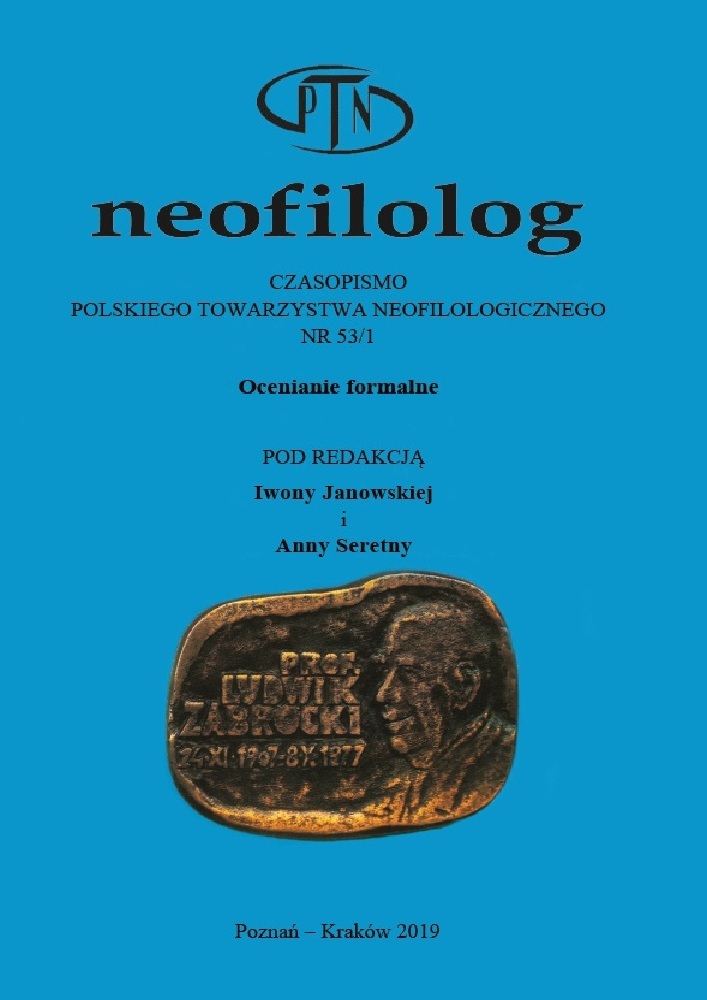Abstract
Teaching business Polish to foreign businessmen in Poland has its specificity: lessons often take place in learners’ offices on a one-to-one basis or in very small groups. Learners are usually very demanding and autonomous. They want to have control over their language learning process but are unwilling to take any tests. Therefore, process of evaluation has to be organized in a less conventional manner. The article reflects on the needs of such learners and describes the most effective ways which, according to its author, measure their skills: formative assessment and task-based assessment.
References
Czetwertyńska G. (2005), Konstruktywizm a ocenianie kształtujące. Jak to się dzieje, że wiemy to, co wiemy i co to ma z poglądami na ocenianie? (w) „Języki Obce w Szkole”, nr 6, str. 16-19.
Czetwertyńska G. (2008), Autonomia nauczania – uczeń dorosły (w) „Języki Obce w Szkole”, nr 6, str. 84-88.
Czetwertyńska G. (2015), Ocenianie jako nauczanie i uczenie się (w) „Języki Obce w Szkole”, nr 3, str. 4-9.
Frendo E. (2005), How to Teach Business English. Edinburgh: Pearson Education Limited.
Gajewska E., Sowa M. (2014), LSP, FOS, Fachsprache ... Dydaktyka języków specjalistycznych. Lublin: Wydawnictwo Werset.
Ligara B., Szupelak W. (2012), Lingwistyka i glottodydaktyka języków specjalistycznych na przykładzie języka biznesu. Podejście porównawcze. Kraków: Księgarnia Akademicka.
Komorowska E. (2017), Sylwetka uczącego się języka polskiego jako obcego dla celów biznesowych. Motywacje, problemy, potrzeby (w) „Acta Universitatis Lodziensis. Kształcenie Polonistyczne Cudzoziemców”, nr 24, str. 167-182.
Sowa M. (2015), Savoir-évaluer, czyli co i jak oceniać w języku obcym (w) „Języki Obce w Szkole”, nr 3, str. 43-48.
License
Copyright (c) 2019 Neofilolog

This work is licensed under a Creative Commons Attribution-NoDerivatives 4.0 International License.
Authors
Authors of texts accepted for publication in Neofilolog are required to complete, sign and return to the Editorial team’s office the Agreement for granting a royalty-free license to works with a commitment to grant a CC sub-license.
Under the agreement, the authors of the texts published in Neofilolog grant Adam Mickiewicz University in Poznań a non-exclusive, royalty-free license and authorize the use of Attribution-NoDerivatives 4.0 International (CC BY-ND 4.0) Creative Commons sub-license.
The authors retain the right to the free disposal of the work.
Users
Interested Internet users are entitled to use works that have been published in Neofilolog since 2017, under the following conditions:
▪ attribution – obligation to provide, together with the distributed work, information about the authorship, title, source (link to the original work, DOI) and the license itself.
▪ no derivatives – the work must be preserved in its original form. Without the author's consent, it is not possible to distribute the modified work in the form of translations, publications, etc.
Copyrights are reserved for all texts published since 2017.
Miscellaneous
Adam Mickiewicz University in Poznań retains the property right as a whole (layout, graphic form, title, cover design, logo etc.).

